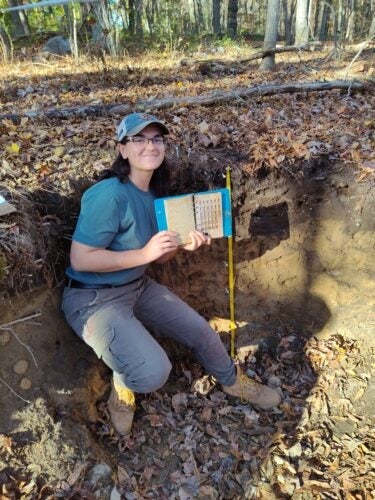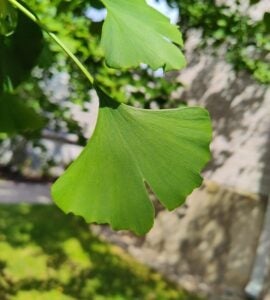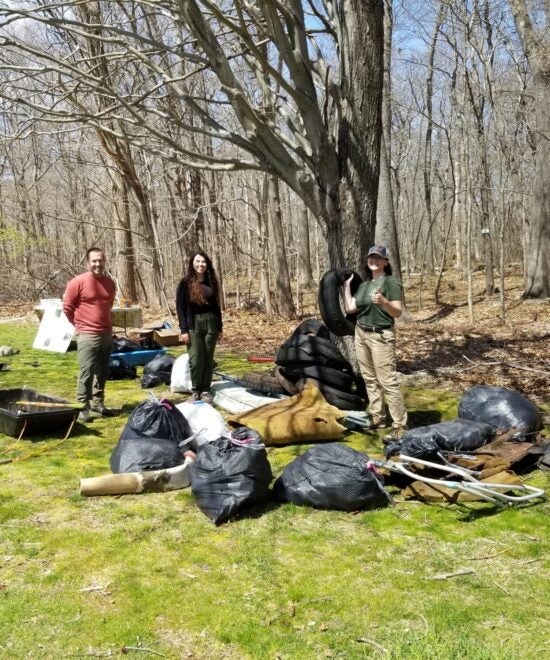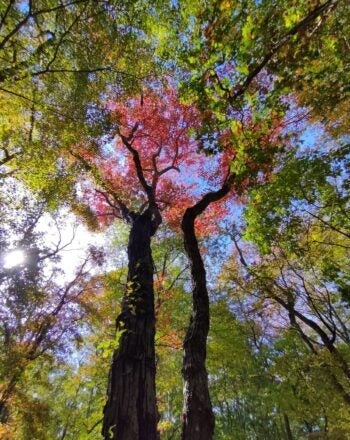By Sarah Schechter, CELS Communications Fellow

Tucked away in a stone garden and juxtaposed against the skyscrapers of Shanghai is a 400-year-old Ginkgo biloba tree that caught the eye of senior, Rachel Howard. “This is my favorite tree,” she recalled thinking as she read the inscription on the plaque beneath. It was on a three-week URI study abroad trip to China that Howard had the opportunity to explore Shanghai and found her way to the Ginkgo. “We’re in this big city, where it’s all skyscrapers and a flood of people, and there was this tree right in this beautiful stone garden,” Howard shared.
Before that moment, Howard viewed her studies in Environmental Science and Management and in Chinese, as separate parts of her academic career. But in Shanghai, she found a welcome connection. “This was the moment where my environmental science and Chinese majors combined and I got to experience both at the same time,” Howard said. That is the beauty of the Environmental Science and Management degree, she says—its interdisciplinary nature offers opportunities for application outside of the College of Environment and Life Sciences.
“I love the environmental science major because it gives you a chance to try everything out,” Howard said. When deciding which aspects of the environment to focus on, she found the abundance of class options to be helpful as she carved her path. “It’s not just wildlife classes or just soils or just plant science, it’s everything and I love learning so many new things,” she explained.


A love for nature began early in Howard’s life and her passion has continued to grow. “I want to be outside,” she shared. “I grew up in the woods and I’ve always been in nature, ever since I was a kid out fishing and building forts.” In high school, she participated in Envirothon, an environmental competition for students. “It was a club for us at Coventry High, outside of the regular curriculum, and it was a good introduction to all these things that I ended up building on with the environmental science major.” But it was a forestry class at URI that turned her passion for the outdoors into a vocation.
“I think the forestry class was a big turning point for me,” she said. “I was interested in wildlife, and I like entomology, but I think the fantastic thing about the woods is that everything lives in the woods.”
It was also through the forestry course that Howard was put in touch with William Walker from the RI Department of Environmental Management (RIDEM), which led to her summer internship as a seasonal technical support intern. “This was great because I got to be everyone’s intern,” Howard said. The multifaceted position presented opportunities to apply techniques from Howard’s coursework and learn about the complexities of forest management through hands-on opportunities out in the woods. “I think a lot of people don’t know that the removal of trees is also part of promoting growth,” Howard said. “It’s not just planting trees when you’re talking about forestry, it’s also selecting what trees are best for that system, and best for the overall ecosystem.”
During the latter half of the internship, Howard’s work involved community outreach on fire safety and prevention. “I got to tell kids the story of Smokey Bear, give adults advice on how to keep their house fire-safe, and describe what all the different fire-safety equipment does,” said Howard. “I think that’s when I can say that it sparked a flame in doing more wildland fire work next summer.” This built on her interest in fire and forest management and further inspired her plans to work as a wildland firefighter out west. She is in the process of acquiring the necessary certifications to do so. Next summer, Howard plans to return to her work with the RIDEM Forest Fire Program and will work as a seasonal support intern for the state.
In the meantime, Howard has also directed her attention to the URI North Woods Stewardship Project, where she quickly assumed a leadership role. Begun in 2020, this student-run project aims to identify how the North Woods can be used to meet the University’s academic and sustainability goals, and manage the space accordingly.
After joining the project team in September of 2021, Howard saw many of the leaders of the project graduate and was told by Professor Michelle Peach, “Rachel, you are the North Woods Project now.” Soon after, she was tapped to lead the project as North Woods Steward. In her new role, Howard leads tours and cleanups throughout the North Woods and helps foster interest in the stewardship project. The project is open to students and faculty from all departments and there are always opportunities to experience the woods. “Seeing people interact with the woods is very rewarding,” Howard said. “On a small scale I’m happy that they’re in the North Woods, and on a large scale, I hope that they can enjoy nature as they continue their lives.”


As she approaches her May 2023 graduation, Howard considers the time spent on RIDEM projects and the North Woods Stewardship Project as ideal complements to her classwork. “If I could do it all over, I would’ve tried to get involved sooner, because now I’m about to graduate, and there’s still all these interesting research opportunities,” Howard reflected.
While she appreciates all of the opportunities on and off campus, she wishes she had more time and recommends that students start reaching out to professors and seek out fellowship and internship opportunities early on in their college careers.
